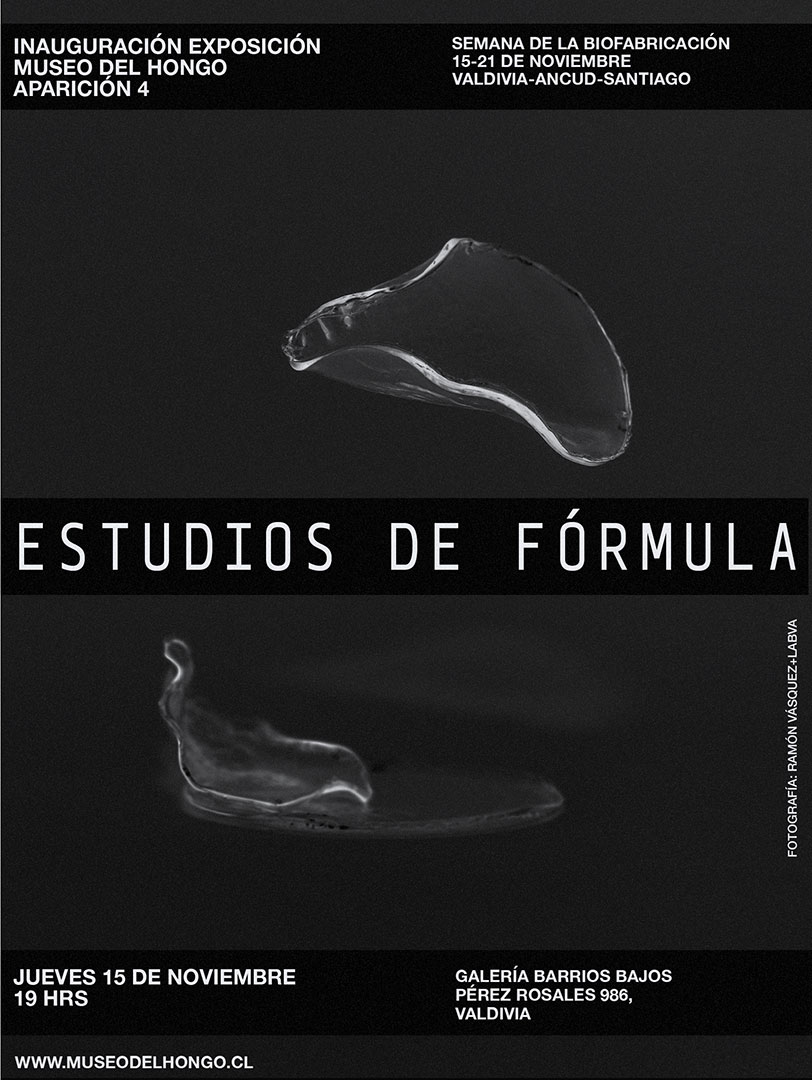
Formula Studies
November 2018
Galería Barrios Bajos
Valdivia, Chile
Humanity, in its quest for productivity, has attempted to accelerate, modify, and control the natural cycles and processes of transformation, interrupting ecology and setting off a global crisis in which materiality plays a fundamental role in the design and architecture industry. The temporality of artwork, the so-called concept of “planned obsolescence”, and the disposal and disappearance of used materials have all unveiled the urgent need for different designers, architects, and artists to renew and reconsider the relationship between nature and culture; to analyze the problem of controlling form as a symptom of our culture’s impulse to dominate material reality; to rethink production logic through the analysis of materiality’s relevance and the symbolic rationales behind our objects.
Thus, as part of RedFungi’s efforts, the FADEU Biofabrication Laboratory and Valdivia’s Biomaterials Laboratory have explored the possibilities of mycelial fungi, algae, bacteria, and other organisms in the elaboration of open source and low-cost biomaterials. Based on principles of collaboration, open science, open sources, free access technologies, and interdisciplinary research, their work is centered on the mastery of known techniques and the exploration of new recipes, with the objective of elaborating controlled, finite, and small-scale objects that provide quantifiable information on biofabrication processes and the materials’ properties.
Rodrigo Arteaga and Andrea Lira’s artistic work, made from living fungi and paper pulp colored with natural dyes respectively, invites us to reflect as well on the use of an organism as a work of art in itself, giving it new museographic value and opening up to the generation of new interactions and experiences surrounding the intersection between art, science, and technology. This, in turn, promotes a near future in which fungi, algae, and bacteria are key players in the path towards responsible social development, given the structuring, binding, and decomposing properties that they possess.
Working with living systems and ecosystems can lead to results that have a large impact on society and ecosystems, simultaneously informing and reformulating existing systems, networks, and paradigms.
Artworks / Artists
Biofilia – Andrea Lira
Nidos – Andrea Lira
Convergencia – Rodrigo Arteaga
Atlas de Chile Regionalizado – Rodrigo Arteaga
Kombucha – Juan Ferrer
FADEU Biofabrication Laboratory Exhibit
Curatorship: Sebastián Rodríguez, Aníbal Fuentes, Josefa Ballacey
Biodesign: Open-source Constructive System Designs Based on Native Fungi – Sebastián Rodríguez, Aníbal Fuentes, Alejandro Soffia, Fernán Federici, Andrés Romero, Javiera Videla, Josefa Ballacey, Constanza Prado Durán, Sebastián Plaza Kutzbach, Matías Espinoza López, RedFungi
Cooking Objects – Patricia Pratt, Ricardo Aliste, Valentina Márquez, Daniel Martínez, Jordanna De la Hoz.
Biofabrication Workshop Prototypes – Carolina Pacheco, Gaspar Guevara, Belén Esquivel, Dánae Medina.
Shaker – Javiera Videla, Sebastián Rodríguez
Low-cost Microscope – Fernán Federici, Josefa Ballacey, Sebastián Rodríguez, Tamara Matute, Isaac Nuñez
JaiMicro – Catalina Lagos, Sebastián Rodríguez, Biofab.uc.
Valdivia Biomaterials Laboratory (LABVA) Exhibit – María José Besoaín, Alejandro Weiss, Valentina Aliaga









